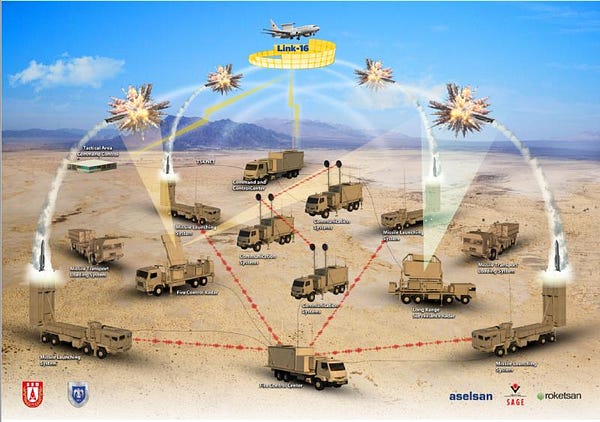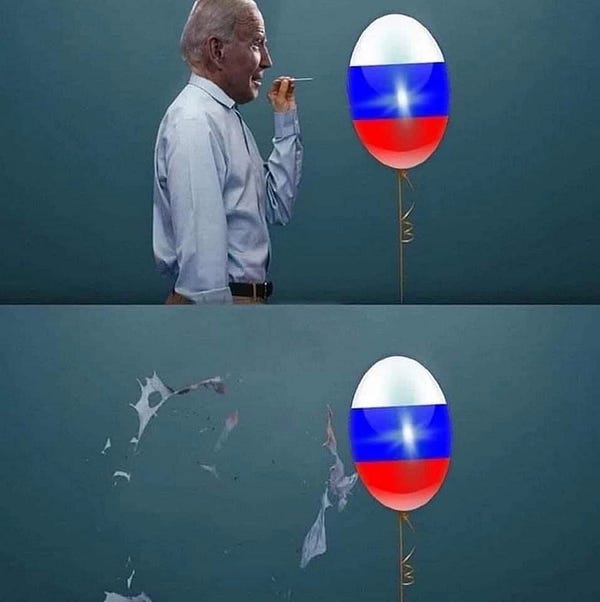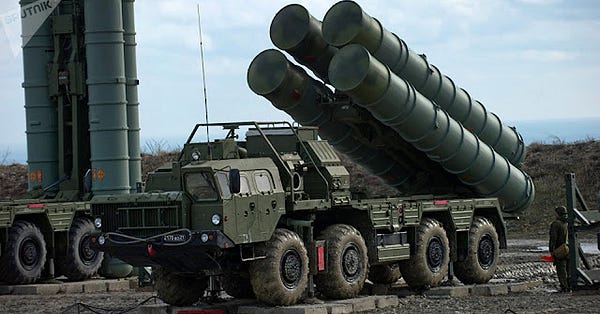Now that Russia has responded in a measured but entirely predictable way to the stupid Kerch bridge attempt to provoke an unmeasured reaction from Russia, everyone is talking air defense. The Russian campaign was almost certainly in the planning for months and was about to happen anyway. What does it tell you that, with Russia having established air superiority long ago, nothing was done about air defense? Zhou says we’re now going to be providing Ukraine with air defense—advanced air defense, at that. It’s a bit late in the day for that. How does anyone think we’re going to get that equipment deployed in a very large country like Ukraine in sufficient quantities to make a difference?


That’s like the extra replacement HIMARS systems we’re going to send—after they get built.
Will Schryver has some excellent stuff on this today, but let’s start with his Twitter thread first.
Here’s Will’s overall perspective:


I think we’re seeing the conflict play out as Schryver predicted in the big picture—a new world order, sans NATO, American Empire, and featuring a multi-polar world. Granted, it’s not playing out in the detailed form that Will presented but, hey, I was similarly wrong in that respect.
The American Empire continues to flail. Beyond the threats and warnings and pleas to Putin, the US is now threatening OPEC+ countries for acting like an oil producers cartel. The Neocons have failed to take account of the changing dynamic in the Middle East—brought about by Russian diplomacy, as opposed to our bare knuckle threats. The result?



And now here we get to the splash of cold water:


This is an eye-opening article. I’ve read about some of this before, but Will puts it in the best package I’ve seen. The scary part—as he points out—is that most of the technical abilities Russia has demonstrated are in the context of battlefield systems. They have lots more that they’re probably not eager to demonstrate. Here are some excerpts, but do yourself a favor and read it all:
I’ve become increasingly intrigued by the fact that western military analysts – even among those not burdened with the epidemic strain of virulent antipathy towards Russia – have not spoken much (if at all) about what I consider to be quite arguably the most impressive revelation of the war in Ukraine.
In addition to imposing a virtual “you fly, you die” rule against the Ukrainian Air Force and the various drones they employ, the Russians are, with a formidable array of air defense systems of varying capacities, routinely shooting down: ballistic missiles, MLRS rockets, HARMS anti-radiation missiles, and even artillery shells.
They are also effectively employing a variety of electronic counter measures to: block signals to GPS-equipped ordnance; spoof the targeting radars of both satellites and radar-equipped missiles, and otherwise confuse the variety of targeting technologies employed in both older Soviet and American weapons being fielded by Ukrainian forces.
This is an absolutely unprecedented achievement on the battlefield.
Neither Israeli nor American systems have ever demonstrated the capability to routinely shoot down advanced missiles or rockets of any type.
Iraqi Scud missiles defeated the American Patriot missile defense system, as have much cruder missiles fielded by the Houthis in Yemen against Saudi targets ostensibly protected by American-provided US air defense systems.
More relevantly, Iranian missiles have proven to be much more formidable than was previously believed. …
...
But what must be understood is that no military on the planet had, previous to the war in Ukraine, consistently demonstrated the capability to do what Russia has been doing routinely for the past six months: imposing from the ground what amounts to a reasonable facsimile of a no-fly zone over those areas of the battlefield where it has chosen to mass its air defenses.
Those who have been reading up on these matters will be aware that air defense units are integral parts of all Russian battle groups.
I don’t understand why a bigger deal is not being made about this.
I am confident that Pentagon war planners are shaken to the casters on their fat leather chairs when they contemplate the significance of what they are seeing play out in Ukraine on an almost daily basis.
It is, in my estimation, a revolutionary development on the battlefield.
And it is a capability that no other nation has yet demonstrated.
Yes, yes, I know … there are some who will start shouting Iron Dome from the back of the room. But seriously … if anyone believes Israel’s Iron Dome is a proven system against advanced missiles or rockets, I'm sorry, but I've seen no evidence to support such faith. They have been used primarily to intercept the rather crude “bottle rockets on steroids” launched from the hapless Palestinians in Gaza – not hardly a glowing resumé.
It remains to be seen if Iron Dome can even stop the now-formidable arsenal possessed by Hezbollah in Lebanon.
As for Iranian missiles? I do not believe Iron Dome could intercept more than a minute fraction of them should a massed strike ever take place.
The performance of Iranian made drones as deployed by the Russian military at least lends credence to this assessment. Irainian technology is not to be sneezed at.
There is also very good reason to suppose they have not revealed their full capabilities in Ukraine, for fear of tipping off the US/NATO in advance of a potential confrontation against them.
In any case, the capabilities already manifest at this juncture appear to me to represent a likely war-winning advantage accruing to Russia in the event of a future conflict against the United States.
Lots more at the link.
Brian Berletic, in his most recent video covers some of these issues as well—especially in the second half.


A few reality based notes about air defense.
America mostly has no air defense, because mostly it needs none. American troops haven't had to seriously worry about being bombed by a hostile air force within the lifetime of anyone now wearing the uniform. Mostly the Air Force takes care of the matter by owning the skies.
On the other hand, we haven't fought a peer competitor within the lifetime of anyone now wearing uniform either.
But what we're really talking about here is missile defense. Rather than get into what would be endless arguments about the likely performance of this or that system vs that other system, let me do the math. Interceptors by and large cost more than the missiles they intercept. You also may need more than one interceptor to intercept a missile since a given interceptor has a kill probability of less than 100%.
So to stop the wave of missiles Russia fired in its revenge attacks would have required more missiles than Russia fired. I do not know the state of Russia's remaining missile inventory, but I doubt that we have a number of interceptors greater than Russia's offensive missile forces. Stopping that recent wave might have used up a year's production of Patriots. (I found a reference on Global Security to a contract in which we got slightly over a hundred Patriots in one year)
LMAO. While our vaunted air defense systems are mediocre, at best, against SCUDs and other primitive technologies, they are utterly useless against Russia’s hypersonic missiles.